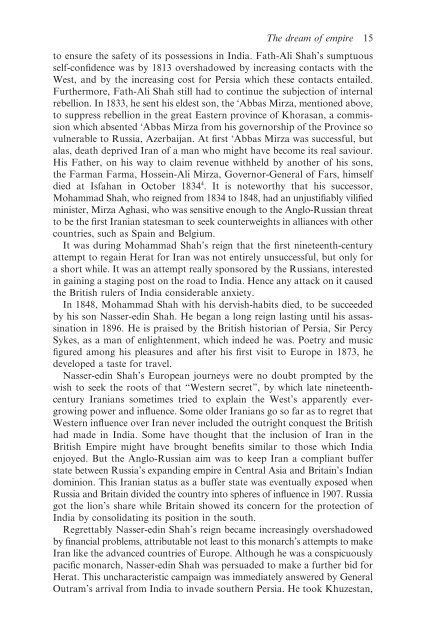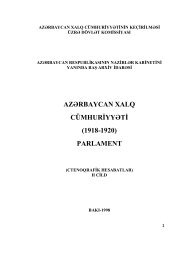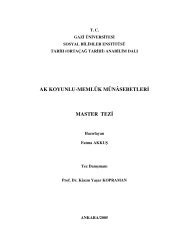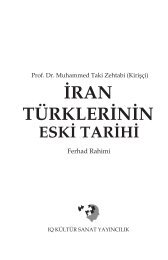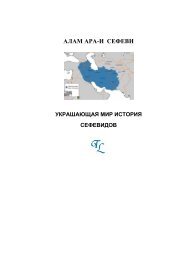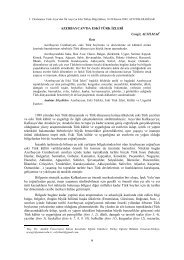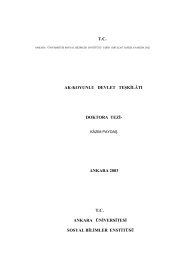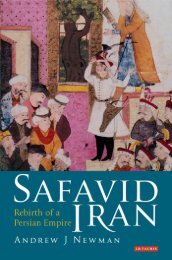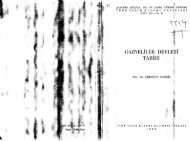War and Peace in Qajar Persia: Implications Past and ... - Oguzlar.az
War and Peace in Qajar Persia: Implications Past and ... - Oguzlar.az
War and Peace in Qajar Persia: Implications Past and ... - Oguzlar.az
- No tags were found...
You also want an ePaper? Increase the reach of your titles
YUMPU automatically turns print PDFs into web optimized ePapers that Google loves.
The dream of empire 15to ensure the safety of its possessions <strong>in</strong> India. Fath-Ali Shah’s sumptuousself-confidence was by 1813 overshadowed by <strong>in</strong>creas<strong>in</strong>g contacts with theWest, <strong>and</strong> by the <strong>in</strong>creas<strong>in</strong>g cost for <strong>Persia</strong> which these contacts entailed.Furthermore, Fath-Ali Shah still had to cont<strong>in</strong>ue the subjection of <strong>in</strong>ternalrebellion. In 1833, he sent his eldest son, the ‘Abbas Mirza, mentioned above,to suppress rebellion <strong>in</strong> the great Eastern prov<strong>in</strong>ce of Khorasan, a commissionwhich absented ‘Abbas Mirza from his governorship of the Prov<strong>in</strong>ce sovulnerable to Russia, Azerbaijan. At first ‘Abbas Mirza was successful, butalas, death deprived Iran of a man who might have become its real saviour.His Father, on his way to claim revenue withheld by another of his sons,the Farman Farma, Hosse<strong>in</strong>-Ali Mirza, Governor-General of Fars, himselfdied at Isfahan <strong>in</strong> October 1834 4 . It is noteworthy that his successor,Mohammad Shah, who reigned from 1834 to 1848, had an unjustifiably vilifiedm<strong>in</strong>ister, Mirza Aghasi, who was sensitive enough to the Anglo-Russian threatto be the first Iranian statesman to seek counterweights <strong>in</strong> alliances with othercountries, such as Spa<strong>in</strong> <strong>and</strong> Belgium.It was dur<strong>in</strong>g Mohammad Shah’s reign that the first n<strong>in</strong>eteenth-centuryattempt to rega<strong>in</strong> Herat for Iran was not entirely unsuccessful, but only fora short while. It was an attempt really sponsored by the Russians, <strong>in</strong>terested<strong>in</strong> ga<strong>in</strong><strong>in</strong>g a stag<strong>in</strong>g post on the road to India. Hence any attack on it causedthe British rulers of India considerable anxiety.In 1848, Mohammad Shah with his dervish-habits died, to be succeededby his son Nasser-ed<strong>in</strong> Shah. He began a long reign last<strong>in</strong>g until his assass<strong>in</strong>ation<strong>in</strong> 1896. He is praised by the British historian of <strong>Persia</strong>, Sir PercySykes, as a man of enlightenment, which <strong>in</strong>deed he was. Poetry <strong>and</strong> musicfigured among his pleasures <strong>and</strong> after his first visit to Europe <strong>in</strong> 1873, hedeveloped a taste for travel.Nasser-ed<strong>in</strong> Shah’s European journeys were no doubt prompted by thewish to seek the roots of that “Western secret”, by which late n<strong>in</strong>eteenthcenturyIranians sometimes tried to expla<strong>in</strong> the West’s apparently evergrow<strong>in</strong>gpower <strong>and</strong> <strong>in</strong>fluence. Some older Iranians go so far as to regret thatWestern <strong>in</strong>fluence over Iran never <strong>in</strong>cluded the outright conquest the Britishhad made <strong>in</strong> India. Some have thought that the <strong>in</strong>clusion of Iran <strong>in</strong> theBritish Empire might have brought benefits similar to those which Indiaenjoyed. But the Anglo-Russian aim was to keep Iran a compliant bufferstate between Russia’s exp<strong>and</strong><strong>in</strong>g empire <strong>in</strong> Central Asia <strong>and</strong> Brita<strong>in</strong>’s Indi<strong>and</strong>om<strong>in</strong>ion. This Iranian status as a buffer state was eventually exposed whenRussia <strong>and</strong> Brita<strong>in</strong> divided the country <strong>in</strong>to spheres of <strong>in</strong>fluence <strong>in</strong> 1907. Russiagot the lion’s share while Brita<strong>in</strong> showed its concern for the protection ofIndia by consolidat<strong>in</strong>g its position <strong>in</strong> the south.Regrettably Nasser-ed<strong>in</strong> Shah’s reign became <strong>in</strong>creas<strong>in</strong>gly overshadowedby f<strong>in</strong>ancial problems, attributable not least to this monarch’s attempts to makeIran like the advanced countries of Europe. Although he was a conspicuouslypacific monarch, Nasser-ed<strong>in</strong> Shah was persuaded to make a further bid forHerat. This uncharacteristic campaign was immediately answered by GeneralOutram’s arrival from India to <strong>in</strong>vade southern <strong>Persia</strong>. He took Khuzestan,


